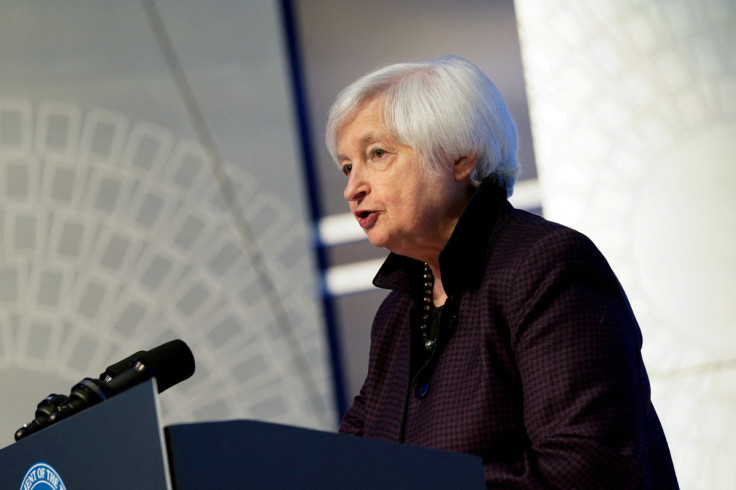Yellen To India: Ending Russia's War In Ukraine Is A 'Moral Imperative'

U.S. Treasury Secretary Janet Yellen will tell India on Friday that ending Russia's war in Ukraine is a "moral imperative," but that economic challenges from the conflict and supply strains were drawing India and the United States closer together.
In excerpts of remarks prepared for delivery at a Microsoft India research facility near New Delhi, Yellen lauded Prime Minister Narendra Modi's recent sharper tone on the conflict after he avoided condemning Russia's invasion for most of the year.
"Prime Minister Modi was correct when he said that this 'is not an era of war,'" Yellen said in the excerpts released by the Treasury.
"I believe that ending Russia's war is a moral imperative. It is also the single best thing we can do to help the global economy. This is a view that is broadly shared among policymakers of the world's major economies," Yellen said.
Officials in India, a country with longstanding ties to Russia, have said they would continue to buy Russian oil at a discount, because this benefits India's economy, despite the efforts of the United States and Western allies to impose a price cap on Russian oil exports.
Treasury officials have said they are not seeking to persuade India to stop buying Russian oil but want to strengthen U.S. ties to India through trade and financial integration.
Much of the focus is to make fast-growing India a counterbalance to China in Asia and a reliable source of goods and services for the U.S. economy.
"The United States and India share an interest in strengthening our supply chains in a world where certain governments wield trade as a geopolitical weapon," Yellen said in her excerpted remarks, citing Russia's restrictions on natural gas sales to Europe as an example.
RELIABLE SUPPLIER
Yellen said India is a natural candidate for "friend-shoring," or the diversification of American supply chains away from China and some other countries where they have become vulnerable to pandemics and other disruptions, to "countries that we can count on."
The U.S. friend-shoring approach involves partnering with developing countries like India that are seeking to grow local industries and connect them to global supply chains.
She cited a $500 million loan from the U.S. International Development Finance Corp to U.S.-based First Solar to begin manufacturing solar panels in the Tamil Nadu region that will boost India's manufacturing capabilities.
"At the same time, it will help diversify supply chains away from China, which currently dominates over 80 percent of global solar panel production," she said, adding that some Chinese solar products are produced with forced labor in the Xinjiang region.
"The United States will continue to deepen our business and commercial ties with India as we pursue our friend-shoring agenda," Yellen said.
© Copyright Thomson Reuters 2025. All rights reserved.





















